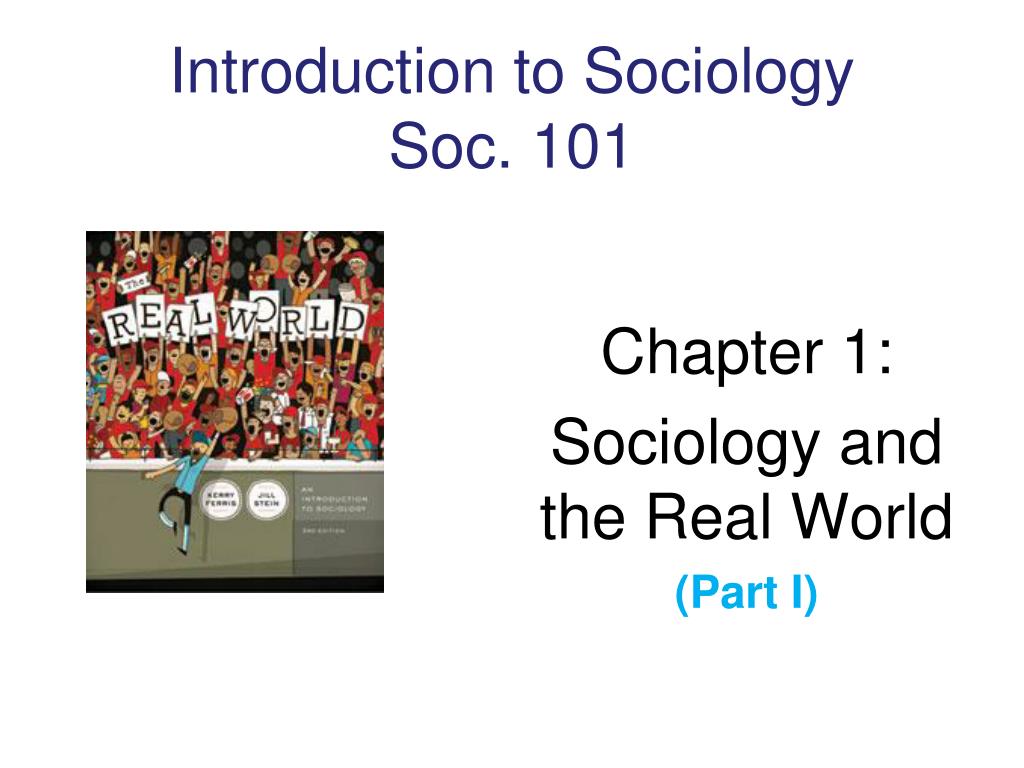Have you ever wondered why people behave the way they do? Why some societies seem to thrive while others struggle? It’s natural to be curious about the world around us, and these are questions that lie at the heart of sociology, the study of human societies and their interactions. Imagine stepping onto a bustling city street, a vibrant tapestry woven with countless stories: families rushing to work, children playing, artists creating, and politicians debating. Sociology, like a magnifying glass, helps us understand the interwoven threads of this complex social fabric, revealing the patterns, forces, and influences that shape our lives.

Image: www.slideserve.com
Sociology 101 is your introduction to this fascinating world, a world where we dissect societal structures, explore social interactions, and uncover the forces that influence our individual experiences. It’s a journey that delves into the complexities of our social world, helping us understand the hidden dynamics within our families, communities, and global society. Whether you’re interested in individual behaviors, social movements, or global inequalities, Sociology 101 provides a foundation for exploring these diverse aspects of human interaction.
The Sociological Lens: Seeing the World Differently
Sociology is not just about observing; it’s about understanding the “why” behind what we see. It invites us to step beyond our personal experiences and examine the broader social forces that shape our lives. Imagine a young woman walking down the street, her phone screen glowing as she interacts with the virtual world. Through a sociological lens, we might ask, “What societal pressures contribute to her dependence on technology? How does her online behavior reflect her identity and social connections? What are the implications of the increasing digitalization of social interactions?” These are just a few of the questions sociologists explore.
A Foundation of Ideas: The Pillars of Sociology
The field of sociology stands on a foundation of key concepts that provide frameworks for understanding the social world. Here are a few essential concepts you’ll encounter in Sociology 101:
- Socialization: The process by which individuals learn the values, beliefs, and behaviors of their society. Imagine a child growing up in a family where learning is highly valued; they’ll likely internalize this value and pursue education.
- Social Structure: The enduring patterns and arrangements within a society, like social groups, social institutions, and cultural norms. Think of a classroom: it has a structure, roles (teacher and students), and rules.
- Culture: The shared beliefs, values, customs, and traditions that define a group of people. This shapes everything from what we eat to how we dress to how we interact with others.
- Social Inequality: The unequal distribution of resources, power, and opportunities within a society. This can manifest in various forms, like gender inequality, racial disparities, and economic gaps.
Understanding the Social World: Applying Sociology to Everyday Life
Sociology isn’t just an academic discipline; it’s a tool for understanding the world around us. Here are some examples of how sociological concepts can be applied to everyday life:
- Understanding social movements: From the Women’s Rights Movement to the Civil Rights Movement, understanding how social movements emerge and gain momentum requires a sociological perspective.
- Navigating cultural differences: Traveling to a new country or interacting with individuals from diverse backgrounds can be enriched by understanding cultural norms and values.
- Interpreting media: Sociologists help us analyze the messages embedded within movies, TV shows, and news reports, offering a critical perspective on media bias and its impact on society.
- Developing a more informed understanding of social issues: Understanding social inequality and its root causes allows us to engage in constructive conversations about social change.

Image: www.studocu.com
Expert Insights and Actionable Tips
Dr. Jennifer A. Silva, a sociologist specializing in poverty and social inequality, emphasizes the importance of developing a sociological imagination: “It allows us to see beyond our individual circumstances and recognize the social forces that shape our experiences.”
Here are some actionable tips for fostering your sociological imagination:
- Be an observer: Pay attention to the interactions, patterns, and dynamics within your community.
- Ask “why”: Challenge assumptions and look for deeper explanations behind social phenomena.
- Read diverse perspectives: Seek out books, articles, and documentaries that explore social issues from different angles.
Soc 101 Introduction To Sociology
The Value of Sociology: A Journey Toward Understanding
Sociology 101 provides a foundation for understanding the complexities of the human experience. It equips us with a framework for analyzing social interactions, comprehending social structures, and recognizing the influence of culture on our lives. By embracing a sociological perspective, we become more informed citizens, equipped to engage in meaningful conversations about social issues and contribute to creating a more just and equitable society.
Are you ready to embark on your own sociological journey? Start by exploring online resources, joining a study group, or engaging in discussions about social issues. The world of sociology awaits, ready to unveil the hidden threads that connect us all.






